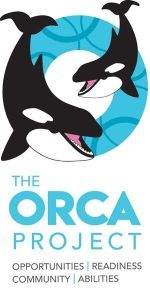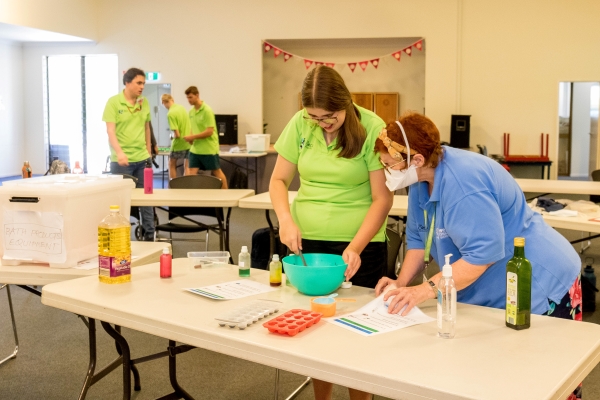The ORCA Project provides work skills training for young adults who value additional support. Our NDIS-approved services, offered in Albany Creek, Mt Gravatt, and Indooroopilly, include the development of transferable work skills and diverse work experience.
To enquire about 2025 enrolments, please complete the form below or call 1800 448 448 for more information.
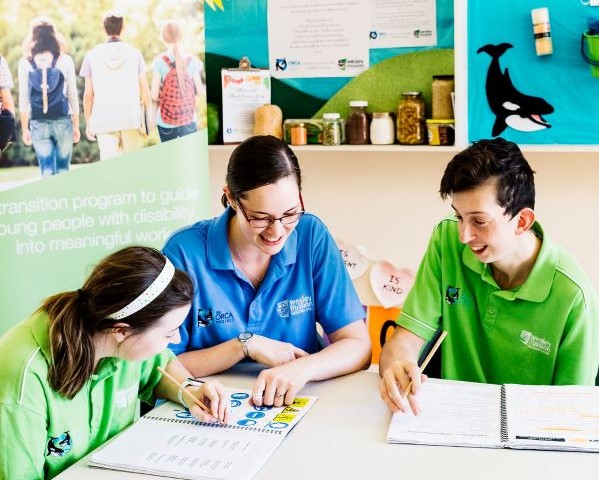
The ORCA Project started as an idea back in 2015.
It was a moment in time when I was watching young people with disability,
not just get trained for work, have this desire to work and then not be able to get at a job.
I couldn't sit back and go, "Oh, that's a shame." "Gee, I wish that someone would do something about that."
The beautiful thing for me was that I found Wesley Mission Queensland, who were already making a difference
and wanted to be a part of that with me.
They wanted to explore and to experiment, and to see what was possible.
(bright music)
The aim of The Orca Project is to help each young person that walks through our
door,
to discover who they are as a person, who they are as a worker, and find where their passions
and their interests can connect with a workplace.
Worker is not a label that is given out of the many hundreds
of labels that our young people get.
Worker hasn't been one of them.
I really believe The ORCA Project is a place where that label of worker can take form,
where young people can take it on and recognize their
value in that space,
to have worker as something that they can be proud of and recognize the way that they can contribute in that space.
That's just really, really important.
It is really hard to name a new program or a new project, or a new thing.
It took many months thinking through what is it that we're trying to create here?
We were really fortunate that the animal we chose had four beautiful letters O-R-C-A.
And
we started to think about what are the things that matter most to us as we create this?
So, O, looking at what are the opportunities that we can find for the young people
that are a part of ORCA.
R became about
readiness.
How do we ensure that people are ready, or a whole lot more ready when they leave us
than when they walk in the door?
C being community, making sure that we never wanted to cut people living with
disability
off in the rest of the world, we wanted to keep connecting with community
and make sure that the community owned this.
And A being about abilities for so much of our young people's lives,
they've been
focusing on the dis of the ability instead of all the things that they can do.
People have told them what they can't do.
We wanna celebrate all that they can do.
And to be able to step out, boldly, and say, I am
someone who has value and worth.
I've got stuff I can contribute to your workplace.
I get so proud of our young people, get so proud of our families
who are willing to go on the journey with us and support those
young people.
I'm so proud of our staff and I'm proud of our community, who's starting to take steps in the right direction,
who's starting to recognize that this matters, it's life changing and it's important,
and
I couldn't be more proud to be a part of that.
We believe that all young people, including those living with disabilities, have unique strengths, skills, challenges, and interests. There is no ‘one size fits all’ approach here at The ORCA Project.
The ORCA Project aims to bridge the gap between the familiar environment of school and what can be a new exciting world of work. Our school leaver employment supports training opportunity provides:
The ORCA Project operates out of three locations in Brisbane:
If you are still in grade 11 or 12 but think you might be ready to start The ORCA Project now, give us a call. We can talk about access to funding, and work with you and your school to determine if coming to The ORCA Project while still enrolled at school is the best option for you.
Wesley Mission Queensland follows the NDIA Price Guide rules and prices. View the recently updated NDIA price guide on the NDIS website.
(This link opens in a new window)
So Simone, her disability is autism level two, and last year, we also found out that she does have ADHD.
Simone was a very scared, nervous child who thought that there was nothing in life for her, that she had no prospects. There was nowhere that she would be able to overcome her disability in a fruitful way in her life. She often said, "Mom, you realize you're just going "to have to look after me? "I'm just gonna be here with you for the rest of my life."
With ORCA, we've been able to work out how we can transition Simone into the next stage of being in a classroom to having one-on-one support at ORCA and to transition her into finding employment, a suitable employment, and what that will look like. So we are currently in that transition stage. She genuinely loves people. She's made good friendships and she feels so well-supported. She knows that if she's got a problem, she can say it and that she doesn't need to fear being vulnerable, that they get her. She's given so much praise and she's been able to do such great work in projects because she's been so well-supported all along the ways. And now the next project, where she's been able to step up even more and be 2IC of The Coffee Cart, which she takes great pride in saying and tells me, "I don't know what Sophie's gonna do without me "because I help her so much."
So to hear that from my child, from being someone who thought that she wasn't able to be productive and achieve anything, to be someone that can, is capable of being 2IC, it's like if she doesn't suffer anxiety anymore. Every day of her life, I had to walk her into school and have someone transition her into the classroom 'cause her anxiety was such. I no longer have to walk Simone in with her clutching, you know, scared, on my hand. She felt supported and that she could leave the car and wave off and say, "See you, Mom. "Have a great day." And I know that she was gonna have a great day, too.
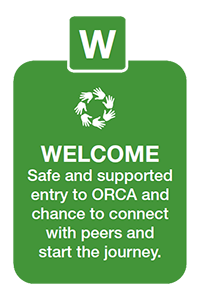
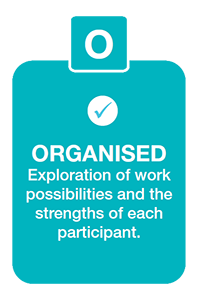
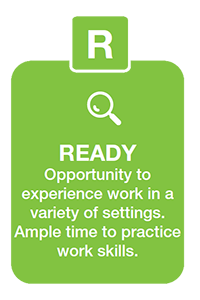
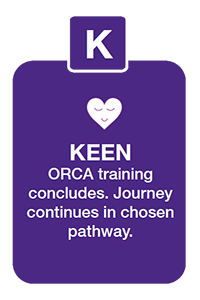
The final stage of the journey to work with ORCA is about supporting you to exit from this service and connect with meaningful work roles. This can include paid work, part time/casual work, traineeships or meaningful volunteer work, depending on what meets your work goals and interests.
